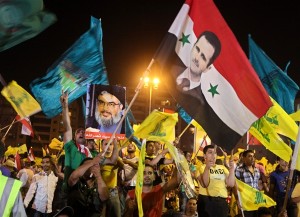 Lebanon’s government has failed to protect villages along the Syrian-Lebanese border and Hezbollah has a “national and moral” duty to defend residents there, one of its leaders said.
Lebanon’s government has failed to protect villages along the Syrian-Lebanese border and Hezbollah has a “national and moral” duty to defend residents there, one of its leaders said.
Nabil Qawooq’s remarks were reported a day after the Shiite border town of Hermel in Lebanon’s northeast came under rocket fire from Syria.
Seven 107mm rockets landed in Hermel and villages around it yesterday without causing casualties, the Lebanese Army said in a statement yesterday.
Prior to the attack, residents in the nearby village of al- Qasr received text messages warning that the Free Syria Army, which is fighting to unseat Syrian President Bashar al-Assad, would bombard the two communities, the Daily Star reported. Hezbollah backs the Assad government.
“Are we expected to leave our people in the border villages subject to murder, abduction, slaughter and displacement?” Qawooq said at a memorial for a Hezbollah fighter, according to the official National News Agency.
Syrian opposition groups and Lebanese political figures opposed to Hezbollah have accused the group of fighting alongside Assad, an Alawite, whose religion is an offshoot of Shiite Islam. Syria’s insurgents are mostly Sunni. Hezbollah is considered a terrorist group by the U.S. and Israel.
Hezbollah Denial
The Syrian National Coalition, the main political opposition group, has called on the Lebanese government to take the necessary steps to end Hezbollah’s involvement in Syria.
Hezbollah has denied it’s fighting in Syria and has said it’s helping Lebanese Shiites living in Syrian border towns and villages to defend themselves against rebel assaults. Syrian government forces have attacked suspected rebel supply routes inside Lebanon with artillery and warplanes.
Human Rights Watch said in a statement today that all parties to the conflict in Syria should stop indiscriminate cross-border attacks on inhabited areas in Lebanon.
“Even if fighters are present in Lebanon, there is no excuse for any warring party to conduct indiscriminate strikes on residential areas,” said Nadim Houry, deputy Middle East director at Human Rights Watch. “All sides need to take all feasible precautions to protect civilians.” Rebels should halt the use of indiscriminate weapons, like rockets, the group said.
The uprising against Assad, which began in March 2011, has killed “well over” 70,000 people, according to a United Nations estimate last month.
Suburb Killings
At least 101 people died during six days of clashes between Assad’s troops and opposition forces in the Damascus suburb of Jdaidet Al-Fadel, including 10 women, three people under 18 and 24 opposition fighters, the opposition Syrian Observatory for Human Rights said in an e-mail. It said some of the victims died in the fighting while others were summarily executed. The number could of dead could rise to 250 as there are many people unaccounted for, the group said.
The casualties occurred as government troops sought to drive rebels out of the suburb of Jdaidet Al-Fadel, Observatory founder Rami Abdel Rahman said in an interview from Coventry, England. He said the suburb was now under government control.
Syria’s official SANA news agency said today the troops have carried out several “operations against terrorists and their dens” in Jdaidet Al-Fadel and Darayya, inflicting losses and destroying their weapons. The opposition Local Coordination Committees said yesterday that government forces killed more than 450 people in Jdaidet Al-Fadel, mostly women and children. Reporters cannot reach the area, making it impossible to reconcile or check the casualty figures.
Aid Doubled
The U.S. will double its non-lethal aid to anti-Assad rebels, U.S. Secretary of State John Kerry announced at a Friends of Syria conference in Turkey yesterday.
The new $123 million in aid “underscores the United States’ firm support for a political solution to the crisis in Syria and for the opposition’s advancement of an inclusive, tolerant vision” for a post-Assad Syria, according to the announcement. Kerry also announced about $25 million in additional food assistance.
Some portion of the non-lethal aid will be used to provide the military opposition with equipment that could include night- vision goggles, radios, military vehicles and body armor.
Bloomberg

Leave a Reply
You must be logged in to post a comment.